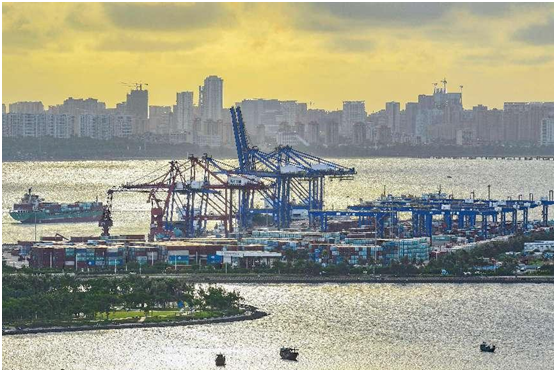By Luo Shanshan, People’s Daily
Service trade is an important part of international trade and a major area of international economic and trade cooperation. Its development is closely related with people’s life quality.
China has achieved sound performance in service trade this year despite the ever-changing external situations. In the first half of this year, China’s service trade value surged 21.6 percent year on year to 2.89 trillion yuan (about $421 billion). In particular, service exports expanded 24.6 percent yearly to nearly 1.41 trillion yuan, and service imports were over 1.48 trillion yuan, up 18.9 percent from a year ago.
The remarkable half-year progress mirrored China’s achievements in high-level opening up.
In recent years, the country has taken multiple measures to promote the high-quality development of service trade and made firm steps to expand opening up.
It has worked to ensure that measures and policies are effectively implemented in cities where pilot projects for the innovative development of service trade are launched. It has kicked off pilot programs to expand opening up in service trade, and introduced and improved a negative list mechanism for cross-border trade in services. Besides, the country has vigorously promoted digital trade, significantly widened market access of the service sector, and expanded imports of high-quality services.
China has maintained the world’s second largest trader of services for years, enjoying steady growth in the trade of knowledge-intensive services.
However, the country’s service trade still sees a long way ahead before it meets the intrinsic requirements of China’s high-quality development.
From a demand-side perspective, service consumption is gradually taking a bigger share in China’s consumption structure that was once dominated by material consumption.
A report by China Institute of Reform and Development predicted that service consumption would account for over half of China’s total consumption by 2025, and the ratio might reach 60 percent to 65 percent by 2035. The upgrading consumption structure is expanding people’s demand for service trade.
From a supply-side perspective, the added value of China’s service sector increased 8.2 percent year on year in 2021 and accounted for 53.3 percent of China’s GDP. The upgrading industrial structure has significantly expanded the country’s demand for service trade. Besides, China’s industrial upgrading and service trade will be closely integrated. For instance, the digitalization of the service sector and digital services are expected to push China’s service trade toward the high end of the value chain.
As China enters a new phase of development, service trade has gradually becomes a new impetus expanding China’s opening up and a new engine driving the country’s domestic demand. It plays an important role in building a new development paradigm.
China will further open up its service industry and accelerate the alignment of the standards and rules in its service sector with those of the world, so as to build a business environment that’s conducive to the development of service trade.
Facing unexpected impacts from both home and abroad this year, China has unswervingly followed a path of high-level opening up to cope with external uncertainties and actively nurtured new advantages in service trade.
In March, seven departments, including the China’s Ministry of Commerce(MOFCOM), approved 40 specialized bases for exports of featured services. So far, these bases, housing 112 exporters, are exporting services in seven sectors, including culture, traditional Chinese medicine and digital services.
Recently, the MOFCOM, together with other 26 departments, jointly issued a piece of opinion on fostering high-quality development of cultural trade to take Chinese culture to the world.
The 2022 China International Fair for Trade in Services will be held in early September. China will definitely attract more high-quality services that will assist its industrial upgrading, make people’s life better and inject new impetus to the development of service trade.
Thursday, June 5, 2025
Booming service trade brings better life to Chinese people
Newsletter
Lorem ipsum dolor sit amet, consectetuer adipiscing elit. Aenean commodo ligula eget dolor.
SUBSCRIBE
Site Links
About Us
We bring you the best Premium WordPress Themes that perfect for news, magazine, personal blog, etc. Check our landing page for details.













